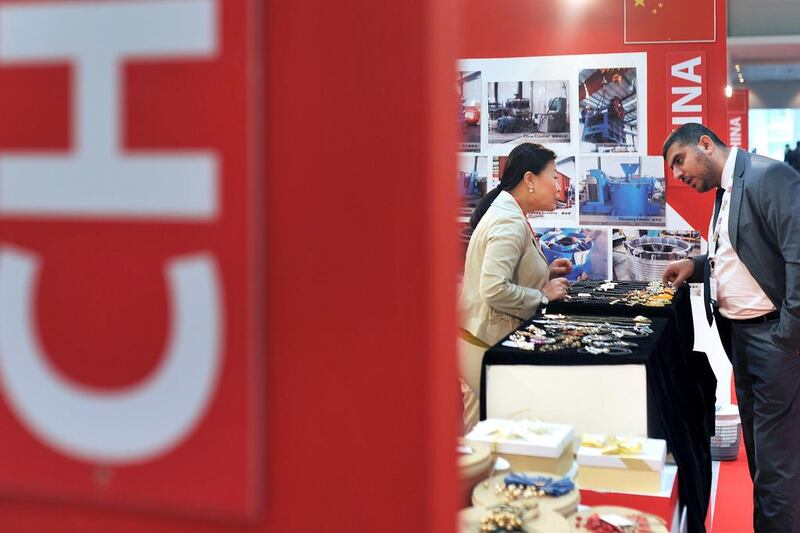Sharjah is in talks with Chinese solar companies on a major grid project as part of a broader push by the UAE to boost non-oil trade with China.
Renewable energy is one of the four strategic industries identified by the Sharjah Investment and Development Authority, known as Shurooq, for economic growth in the emirate.
Shurooq had the largest presence at the inaugural Chinese government-sponsored China Trade Week exhibition, which was opened yesterday at the Abu Dhabi National Exhibition Centre by China’s ambassador, Chang Hua, and UAE foreign trade representatives.
The China Trade Week initiative comes ahead of a three-day visit by Sheikh Mohammed bin Zayed, Crown Prince of Abu Dhabi and Deputy Supreme Commander of the Armed Forces, beginning next Sunday.
That visit will include a trade component, according to Wam, the state news agency. Sultan Al Jaber, the UAE Minister of State, will also be part of the delegation and is expected to sign bilateral trade deals while in China, including in the renewable energy sector.
“The talks are at an early stage but there is great potential for the solar sector in Sharjah,” Mohamed Al Musharrkh, head of investment promotion at Shurooq, said of the Chinese solar project.
He declined to identify which Chinese companies were involved and added that there are still details to work out, including land available for a solar park and tariffs with the emirate’s utility, Sharjah Electricity and Water Authority.
Shurooq estimates the renewables market has potential to reach US$51 billion in the emirate, both in terms of manufacturing and locally generated electricity.
The renewable energy sector has also been identified as one of the key non-oil sectors targeted for Chinese investment in the UAE as a whole, according to Juma Al Kait, a foreign trade official at UAE’s Ministry of Economy.
“The priorities for the UAE are to diversify the economy so we don’t rely on oil and with China there is also a need to diversify our trade,” Mr Al Kait said.
UAE-China bilateral trade last year reached a record $55bn. Although that was dominated by the hydrocarbon sector, it included a growing share in petrochemicals, where China has joint ventures with UAE state sector companies.
“We expect trade volume this year will exceed $50bn despite the drop in oil prices,” said He Song, an economic adviser to China’s ambassador.
The most promising sectors for growth are tourism and finance, as well as renewable energy, Mr He said.
He also noted that technology companies are eyeing the UAE as hubs for regional growth, citing the opening this year of Huawei Technology’s regional headquarters in Dubai, alongside a partnership deal with Etisalat.
The China Trade Week initiative is part of the Chinese government’s broad strategy to boost trade and other relationships with the Middle East and Africa – China’s “One Belt, One Road” initiative, in reference to the old Silk Road trading routes.
Part of that strategy is to locate some of China’s manufacturing base abroad and renewable energy is among the most promising in the region, especially solar which has been growing exponentially.
Capacity grew from 70 megawatts to 287MW in the seven years through 2014 and it is forecast to reach 1,5000MW by 2020 if the $50bn of proposed projects are undertaken, according to the Middle East Solar Industry Association.
As part of this trend, Chang Zhou Almaden this year broke ground on a 15,000 square feet solar panel factory in Dubai, with an estimated Dh110 million investment.
amcauley@thenational.ae





